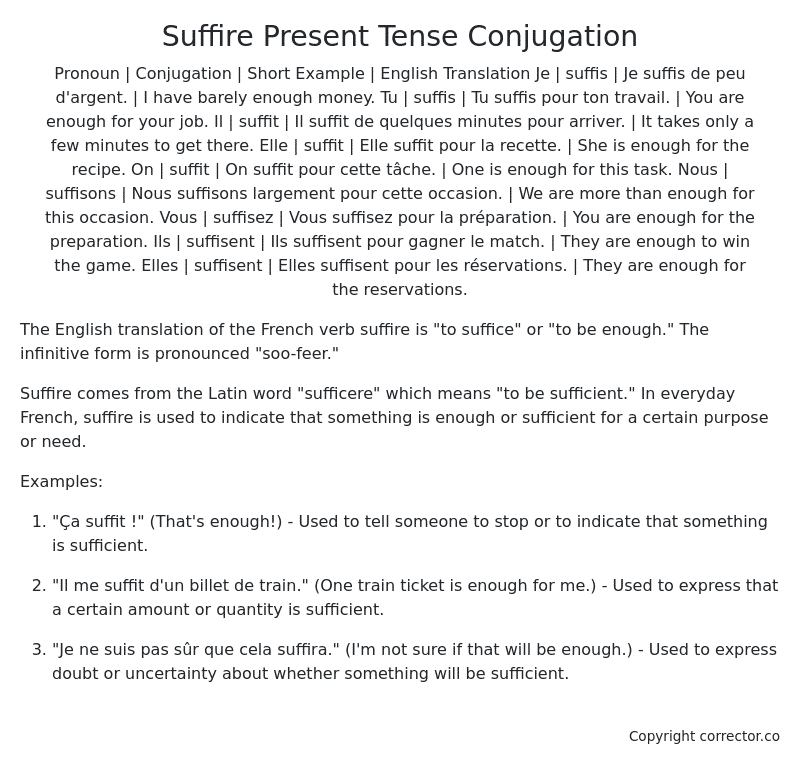Le Present (Present Tense) Conjugation of the French Verb suffire
Introduction to the verb suffire
The English translation of the French verb suffire is “to suffice” or “to be enough.” The infinitive form is pronounced “soo-feer.”
Suffire comes from the Latin word “sufficere” which means “to be sufficient.” In everyday French, suffire is used to indicate that something is enough or sufficient for a certain purpose or need.
Examples:
-
“Ça suffit !” (That’s enough!) – Used to tell someone to stop or to indicate that something is sufficient.
-
“Il me suffit d’un billet de train.” (One train ticket is enough for me.) – Used to express that a certain amount or quantity is sufficient.
-
“Je ne suis pas sûr que cela suffira.” (I’m not sure if that will be enough.) – Used to express doubt or uncertainty about whether something will be sufficient.
Suffire – About the French Present Tense
To take a deep dive into all the French tenses then see our article on Mastering French Tense Conjugation.
Common Everyday Usage Patterns For Le Present
Interactions with Other Tenses
Table of the Present Tense Conjugation of suffire
Pronoun | Conjugation | Short Example | English Translation
Je | suffis | Je suffis de peu d’argent. | I have barely enough money.
Tu | suffis | Tu suffis pour ton travail. | You are enough for your job.
Il | suffit | Il suffit de quelques minutes pour arriver. | It takes only a few minutes to get there.
Elle | suffit | Elle suffit pour la recette. | She is enough for the recipe.
On | suffit | On suffit pour cette tâche. | One is enough for this task.
Nous | suffisons | Nous suffisons largement pour cette occasion. | We are more than enough for this occasion.
Vous | suffisez | Vous suffisez pour la préparation. | You are enough for the preparation.
Ils | suffisent | Ils suffisent pour gagner le match. | They are enough to win the game.
Elles | suffisent | Elles suffisent pour les réservations. | They are enough for the reservations.
Other Conjugations for Suffire.
Le Present (Present Tense) Conjugation of the French Verb suffire (this article)
Imparfait (Imperfect) Tense Conjugation of the French Verb suffire
Passé Simple (Simple Past) Tense Conjugation of the French Verb suffire
Passé Composé (Present Perfect) Tense Conjugation of the French Verb suffire
Futur Simple (Simple Future) Tense Conjugation of the French Verb suffire
Futur Proche (Near Future) Tense Conjugation of the French Verb suffire
Plus-que-parfait (Pluperfect) Tense Conjugation of the French Verb suffire
Passé Antérieur (Past Anterior) Tense Conjugation of the French Verb suffire
Futur Antérieur (Future Anterior) Tense Conjugation of the French Verb suffire
Subjonctif Présent (Subjunctive Present) Tense Conjugation of the French Verb suffire
Subjonctif Passé (Subjunctive Past) Tense Conjugation of the French Verb suffire
Subjonctif Imparfait (Subjunctive Imperfect) Tense Conjugation of the French Verb suffire
Subjonctif Plus-que-parfait (Subjunctive Pluperfect) Tense Conjugation of the French Verb suffire
Conditionnel Présent (Conditional Present) Tense Conjugation of the French Verb suffire
Conditionnel Passé (Conditional Past) Tense Conjugation of the French Verb suffire
L’impératif Présent (Imperative Present) Tense Conjugation of the French Verb suffire
L’infinitif Présent (Infinitive Present) Tense Conjugation of the French Verb suffire
Struggling with French verbs or the language in general? Why not use our free French Grammar Checker – no registration required!
Get a FREE Download Study Sheet of this Conjugation 🔥
Simply right click the image below, click “save image” and get your free reference for the suffire Present Tense tense conjugation!

I hope you enjoyed this article on the verb suffire. Still in a learning mood? Check out another TOTALLY random French verb present conjugation!

